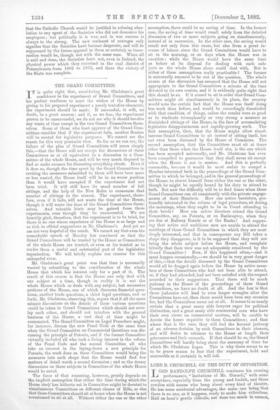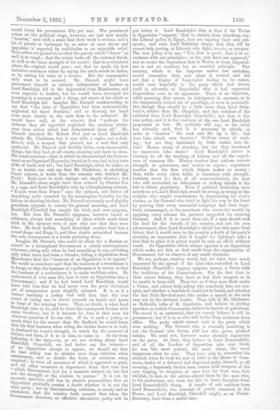LORD R. CHURCHILL ON THE DUTY OF OPPOSITION.
TO'ilD RANDOLPH CHURCHILL continues his evening performance, "Imitations of Mr. Disraeli," with some acceptance, especially from the young and foolish, and those rowdies with means who hang about every kind of theatre. He has some accidental advantages, the main one being that there is no one, as it happens, ready to make him ridiculous. Half an hour's gentle ridicule, not done too much in earnest,
would lower his pretensions fifty per cent. The prominent actors on the political stage, however, are just now mostly "heavies," men with a sense that their work is serious, and a bit of parody or burlesque by an actor at once clever and impudent is regarded by multitudes as an enjoyable relief. True critics are pained to see that the parody which " draws " so well is so rough ; that the mimic lacks all the external finish, as well as the inner strength of his model ; that he gesticulates where the original would pose ; and that he spoils his best imitative sentences either by saying the catch-words in italics, or by raising his voice to a scream. But the commonalty only want to be amused. Mr. Disraeli might have announced himself as entirely independent of leaders as Lord Randolph did to the deputation from Manchester, and even superior to leaders, but he would have conveyed his meaning in a sarcasm and a shrug, not sworn at his chiefs as Lord Randolph did. Imagine Mr. Disraeli condescending to say that " the duty of Opposition had been systematically neglected for three Sessions," and so showing his hand even more clearly to the mob than to the initiated ! He would have said, at the utmost, that " perhaps the sickness they all regretted explained the cautious abstin- ence from action which had disheartened them all." Mr. Disraeli attacked Sir Robert Peel just as Lord Randolph attacks Mr. Gladstone, but it was with a rapier, not a dust- shovel, with a weapon that pierced, not a tool that only spattered. Mr. Disraeli said terribly bitter, even inexcusable, things, but they had, at all events, meaning and force in them. His worst sentence—that in which he characterised the Govern- ment as an.Organised Hypocrisy, brutal as it was, had in it a trace alike of truth and wit ; but Lord Randolph, when he wishes to be as brutal, can only say that Mr. Gladstone, in abolishing Court valuers, is worse than the assassin who stabbed Mr. Field I Both men in such sayings are simply abusive ; but Mr. Disraeli's abuse might have been uttered by Charles Fox in a rage, and Lord Randolph's only by a blaspheming cabman. "You're wuss than Peace I" says the cabman, and drives off chuckling, quite consoled by his meaningless brutality for his failure in cheating his fare. Mr. Disraeli constantly used slightly grandiose epigram to convey his general meaning, and Lord Randolph Churchill has caught his trick, and uses epigram, too. But then Mr. Disraeli's epigrams, however tumid or arbitrary, always had something in them which made them stick in the memory even of men who saw that they were false. He fired bullets. Lord Randolph crushes dust into a round shape and flings it, and then stands astonished because the only consequence is a feeble pattering down.
Imagine Mr. Disraeli, who could sit silent for a Session or accord to a trintnphant Government a calmly contemptuous tolerance, rising only when he bad something to say, criticising only when there had been a blunder, telling a deputation from Manchester that the " business of an Opposition is to oppose." He would as soon have said that the business of a swordsman is to lunge, or that the business of a policemen is to arrest, or that the business of a confectioner is to make wedding-cakes. He understood, if ever man did, how to turn an Opposition into a Government ; and if he had heard Lord Randolph, would have told him that he had never seen the great rhetorical art of compression more stupidly misused. It is as if a trainer teaching a jockey had told him that the true Secret of racing was to throw yourself on hands and knees in front of the winning horse. That, no doubt, is what Lord Randolph tries to do, and he bears his consequent bruises with some hardiesse, but it is because he does it that even his admirers question if he can ride, If lie is such a jockey, so much fitter for the mount than Sir Stafford, he would know that his first business when riding the feebler horse is to wait, to husband his beast's strength, to. watch for the moment of failure, and then, if it is in him, to come in. So far from believing it the duty—or, as we are writing about Lord Randolph Churchill, we had better say the interest- 9f an Opposition •always to oppose, we should say that Its best policy was to abstain even from criticism when unnecessary, and so double the force of criticism when required ; to treat all measures of which it approved as good, ,and. ,all other measures as departures from that true line
which Government had for a moment entered on, but had not the strength or the wisdom to pursue." It is not by sarcastic speeches, still less by abusive personalities, that an Opposition gradually creates a doubt whether it is not the wiser party ; but by discriminating criticism, so steady and so consistent, that the country feels assured that when the Government blunders, an effective alternative policy will be put before it. Lord Randolph's idea is that if the Tories in Opposition " support," that is, abstain from attacking, say, the Liberal policy in Egypt, they are injuring their own pro- spects ; and even Lord Salisbury shares that idea, till he cannot help jeering at Liberals who fight, invade, or conquer. The true policy is to say, Yes, that is good ; that is in ac- cordance with our principles ; so far, you have our approval," and so create the impression that in Tories, at least, Imperial-
ism is not an accident, but an essential principle. The country, which in the long-run makes few mistakes, would remember that, and when it wanted and did not find a display of Imperialist feeling in its rulers, would turn hopefully to the party which had shown itself in adversity so Imperialist that it had supported Imperialism even in its opponents. There is no objection, while pursuing that course, to indulgence in sarcasm, or in the temporarily extinct art of persiflage, or even in personali- ties, though they should be a little truer than Lord Salis- bury's, wittier than Mr. Chaplin's, and less redolent of the cabstand than Lord Randolph Churchill's ; but that is the true policy, and it is the converse of the one Lord Randolph propounds as law, He probably will say, as his chief has virtually said, that it is necessary to attack, in order to " hearten " the rank and file up a bit ; but does false attack ever hearten ? Soldiers weary of waits ing ; but are they heattened by little rushes into de- feat ? Horses weary of standing, but •are they heartened by successive false starts ? Lord Randolph's advice is contrary to all the teaching of history and all the experi- ence of common life. History teaches that nations recover strength in quiescence, and armies in repose ; experience teaches that the firm which fidgets makes no money ; that, while every other, foible is consistent with strength, fussiness never is ; that, of all conversationists, the man who will contradict on side-points or trifling details is the last to obtain popularity. Even if political leadership were merely an art, Lord Randolph would be wrong, as wrong as the sculptor who sought commissions by depreciating his rival's statues, or the General who tried to fight his way to the front by proving that every successful campaign had been hope- lessly mismanaged, or the merchant who strove for wealth by opposing every scheme his partners suggested for securing business. And if it is more than art, if a man should seek the lead for the benefit of his country, and not his own advancement, then Lord Randolph's advice has this more fatal defect, that it would raise in the country a doubt of his party's sincerity, an impression that it fought for fighting's sake, a fear that to place it in power would be only an effort without result, An Opposition which always opposes is an Opposition which seeks, not this or that result from the organisation of Government, but an absence of any result whatever.
We are, perhaps, wasting words, but we have been much impressed by the spread of the false idea embodied in Lord Randolph Churchill's coppery epigram among a Party with the traditions of the Conservatives. For the first time in their recent history, they have so lost their tempers as to be unable to keep still. They fret as if they were Reds under a Camas, and cannot help asking why somebody does not con- spire, and whether a bombshell could not be found, and whether the last little Revolutionist who makes a speech to the mob may not be the destined leader. They talk of Mr. Gladstone as Belleville talks of M. Gambetta, and believe in girding speeches as foolish Communists believe in barrels of petroleum. The mood is so unwonted, that we cannot believe it will be permanent; but if it is, so also will be the Tory exclusion from office. The party which cannot wait is the party which wins nothing. The General who is eternally marching is not the General who forces, still less who gains, pitched battles. We need not, however waste abstract arguments on the party. At least, they believe in Lord Beaconsfield ; and of all the Leaders of Opposition who ever lived, he was the most patient, the most silent, the most dangerous when he rose. They have only to remember his attitude when he took his seat in 1868 in the House of Com- mons, leader of a defeated and dispirited party, himself, to all, seeming, a hopelessly beaten man, beaten with weapons of his own forging, to recognise at once how far from wise, how childish, in fact, is the advice offered them by the man who, to his misfortune, was born too late to learn discipline from Lord Beaconsfield's thong. A couple of soft epithets from Lord Beaconsfield, two minutes of gentle comment in the House, and Lord Randolph Churchill might, as an Under- Secretary, have been a useful man.







































 Previous page
Previous page